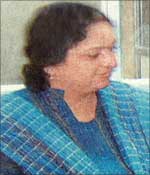|
|
| Help | |
| You are here: Rediff Home » India » News » Report |
|
 | |||
| Related Articles | |||
|
•
Aarushi Murder Case
| |||
| |||||||||||||||||||||||
|
| |||||||||||||||||||||||
Why does every high profile case in the country have a Bengaluru connection? It is thanks to the Forensic Sciences Laboratory, which has now become a favourite destination for investigators from across the country.
With 1,200 narco analysis tests which include tests on Abdul Karim Lala Telgi, Abu Salem [Images], Preethi Jain, 3,500 polygraph tests and 1,800 brain mappings, there is not a single dull moment at the FSL in Bengaluru.
What is interesting is that there has been just one lady who has conducted all these tests almost single handedly.
Meet Dr Malini, the assistant director, FSL Bengaluru, who has played the lead role in all the tests that have been conducted.
Dr Malini, who is a mother of two children narrated to rediff.com her experience at the FSL Bengaluru where she has dealt with 130 suspected terrorists, 15 Naxalites and several other criminals. Here she speaks exclusively to rediff.com:
I am not a police officer and I do not extract information as a neutral fact finding scientist. I only ask when and how the crime was committed and never why.
I was working at Nimhans, Bengaluru at the de-addiction centre. I was then asked to join the FSL at Bengaluru to help out with the polygraph tests.
At that time narco analysis tests were not being conducted and I thought the introduction of this test would help the investigation process. I then prepared a paper relating to narco-analysis and presented it to the Ministry of Information Technology, following which the use of this technique was approved in 2000.
The first time that narco analysis tests came to be recognised in Karnataka was in 2000 when through this technique, the Karnataka police solved a sensational murder case from Mysore.
The test was conducted on a witness who could not speak as he was in a state of shock. However during the test, he managed to open up and narrated the sequence of events which led to the murder.
It was after this case that the FSL sprung into the limelight and investigating agencies from across the country began taking the help of the Bengaluru FSL.
The road has sure not been easy and there have been highs and lows in this eight year journey. I have been abused and even attacked by some of the suspects who have been brought for the tests. Zahid, a suspect in the Mumbai serial blasts case, had rammed into her as a result of which I fell down and fractured my arm. We had sedated him and were preparing to conduct the test on him. However, he jumped out of the bed and tried to escape and in the bargain hit me hard.
When I was conducting the tests on Abdul Karim Lala Telgi, a stranger managed to enter into the lab to strangle me. I was preparing for the test and while I was walking up the steps, a stranger followed me. He pounced on me and tried to strangle me. I screamed for help and then he ran away from there.
I also had a lucky escape when I was conducting a test on an accused involved in a murder case from Bengaluru. Four men clad in police uniforms walked into the laboratory and ransacked the entire room. It was obvious that I was the target. Luckily for me, I was not inside the room when the incident took place.
This definitely is a professional hazard, but I don't let such incidents deter me. The job is exciting for me and I never let such incidents come in the way. Yes I do agree that I hardly get time to spend with my family as these tests take up all my time. I cannot complain either, because duty comes before self.
There is a question mark that has been raised regarding the admissibility of such tests in the courts of law. I would not want to comment on this because a matter to this effect is pending before the Supreme Court and I think the court should take a decision on this.
|
|
| © 2008 Rediff.com India Limited. All Rights Reserved. Disclaimer | Feedback |